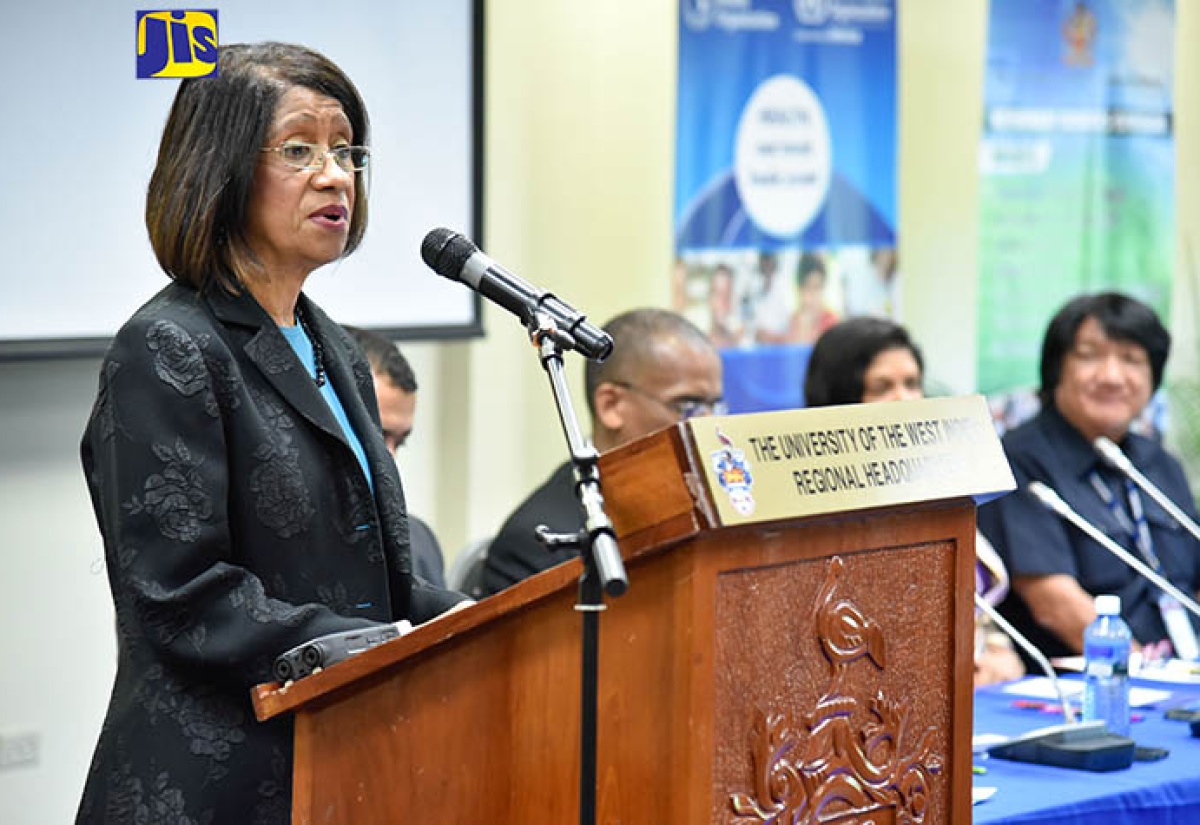Public Warned About Misuse of Antibiotics
By: , December 11, 2017The Key Point:
The Facts
- AMR is caused by a number of factors, including over-prescribing of antibiotics, patients not finishing their treatment, over-use of antibiotics in livestock, fish and crops; poor infection control in hospitals, clinics and unclean facilities, lack of hygiene and poor sanitation.
- Members of the public are being encouraged to play their part in slowing antibacterial resistance by only using antibiotics prescribed by a certified health professional. Persons are also advised to always take the full prescription, even if health improves.
The Full Story
The Ministry of Health is warning members of the public of the negative impact on health caused by the excessive use or misuse of antibiotics.
Antibiotic/antimicrobial resistance (AMR) is the result of the abuse of antibiotics. AMR occurs when bacteria change and become resistant to the antibiotics used to treat the infections they cause.
AMR is caused by a number of factors, including overprescribing of antibiotics, patients not finishing their treatment, overuse of antibiotics in livestock, fish and crops; poor infection control in hospitals, clinics and unclean facilities, lack of hygiene and poor sanitation.
As a result, standard treatments become ineffective, infections persist and may spread to others. The condition also increases the prevalence of drug-resistant bacteria in humans, animals, plants and the environment.
This poses a great threat to public health, as persons of any age are vulnerable to untreatable infections from surgical site infections, minor injuries or even colds, which can cause life-threatening complications from ‘superbugs’ such as tuberculosis (TB) and malaria.
In response to this public health threat, the Ministry of Health in collaboration with its partners, has come up with a National Action Plan (NAP) to tackle AMR.
Under the NAP, the Ministry of Health will be establishing a surveillance system of antibiotic-resistant infections and strengthening infection prevention and control measures.
Additionally, the Ministry, in collaboration with the UWI, will be undertaking a public education campaign on the impact of antibiotic resistance.
Members of the public are being encouraged to play their part in slowing antibacterial resistance by only using antibiotics prescribed by a certified health professional. Persons are also advised to always take the full prescription, even if health improves.
Persons should never share leftover antibiotics with others, and should prevent infections by regularly washing hands and keeping vaccinations up to date.
A major component of the action plan is stricter regulation and promotion of the appropriate use of quality medicines among healthcare professionals.
Health workers are also being urged to participate in the initiative by ensuring that hands, instruments and the environment are clean; to only prescribe and dispense antibiotics when they are needed, in accordance with current guidelines; report drug-resistant infections to surveillance teams; and talk to patients about how to take antibiotics correctly.
These workers are also charged with educating patients about the dangers of antibiotic resistance and the dangers of misuse. Medical professionals are also urged to talk to patients about methods of preventing infections through vaccination, hand washing, safe sex practices and covering nose and mouth when sneezing or coughing.
The food production industry is also integral to arresting AMR by promoting and adopting good practices at all steps of production and processing of foods from animal and plant sources.
Stakeholders within the agricultural sector can also adopt sustainable systems with improved hygiene and biosecurity, proper handling of livestock, and ensuring that antibiotics given to animals are only used to control or treat infectious diseases.
Animals should be vaccinated to reduce the need for antibiotics, and the development of alternatives to the use of antibiotics in plants is also encouraged.
Food producers are also encouraged to implement international standards and guidelines for the responsible use of antibiotics. These standards are established by the World Health Organization (WHO), Animal Health (OIE) and the Food and Agriculture Organization of the United Nations (FAO).
Noting that 20 to 50 per cent of antibiotic prescriptions are unnecessary, Permanent Secretary in the Ministry of Health, Sancia Bennett-Templer, is calling on health workers to dispense these drugs judiciously.
“It is a fact that antibiotic resistance is putting the achievements of modern medicine at risk. Organ transplants, chemotherapy and surgeries such as caeserian sections become much more dangerous without effective antibiotics for the prevention and treatment of infections where antibiotic resistance becomes a problem,” she notes.
Pan American Health Organization (PAHO)/World Health Organization (WHO) Consultant, Dr. Kam Mung, has commended the Government and local health officials for the effort in establishing a multisectoral national action plan to combat this threat.
“We at PAHO congratulate Jamaica because of the formation of the anti microbial resistance technical working group,” he says.
Noting that almost half a million people have developed multidrug-resistant tuberculosis, Dr. Mung said the action plan will assist in the national effort to stem the devastating health impact associated with the condition.
Meanwhile, Medical Microbiologist at the University Hospital of the West Indies, Dr. Alison Nicholson, tells JIS News that the UWI has been conducting research into the condition to better prepare the health sector to manage the effects of AMR.
“At the UHWI we monitor the organisms and look for resistance. We monitor our resistance patterns and take it further by doing research. We try to figure out what is the mechanism of this resistance. We look at the organisms and track them, so we know what organism causes which diseases,” Dr. Nicholson explains.
The NAP is being executed through a multisectoral technical working group comprised of the Ministries of Health and Industry, Commerce, Agriculture and Fisheries; the Pan American Health Organization (PAHO)/World Health Organization (WHO) and the University of the West Indies (UWI).


